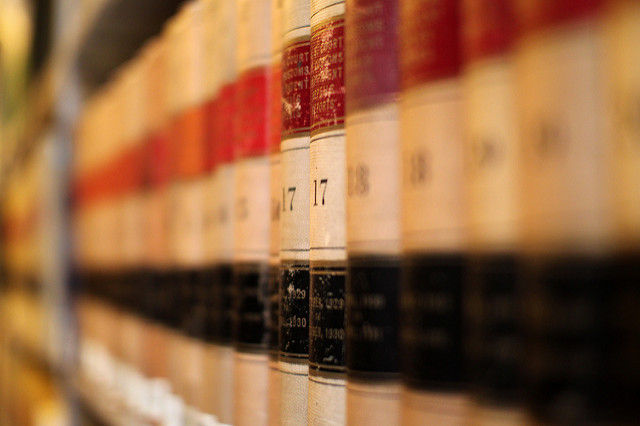
Two big-name legal research companies are battling in federal court over the right to exclusively publish the law—in this case, the Georgia Administrative Rules and Regulations.
The lawsuit (PDF) comes as states across the nation partner with legal research companies to offer exclusive publishing and licensing deals for digitizing and making available online the states' reams of laws and regulations. The only problem is that the law is not copyrightable—or so says one of the publishers involved in the Georgia litigation. In this instance, District of Columbia-based legal publisher Fastcase wants a judge to fend off a cease-and-desist demand from rival Virginia-based Lawriter, which has been designated as the exclusive publisher (PDF) of Georgia's compilation (PDF) of the rules and regulations of its state agencies. The lawsuit says:
The Georgia Regulations are binding law—a broad-ranging collection of rules and regulations governing areas from consumer protection to banking to elections. The Georgia Regulations are promulgated by public agencies of the State of Georgia, and published for the benefit of the public by the Georgia Secretary of State, as required by O.C.G.A. § 50-13-7. Defendant Lawriter purports to have exclusive rights to publish the Georgia Regulations. Consistent with this claim of exclusive rights, Lawriter has sent Plaintiff Fastcase a demand that Fastcase remove the Georgia Regulations from its legal research service, which is provided as a free member benefit to members of the State Bar of Georgia. The Georgia Regulations are public law published under statutory mandate and are in the public domain. Defendant cannot claim any exclusive right in, to, or in connection with, the Georgia Regulations. Thus, Fastcase seeks declaratory judgment that Lawriter has no basis from which to prohibit Fastcase from publishing the Georgia Regulations in its subscription legal research service.
Fastcase also says Lawriter "cannot claim a valid copyright or an exclusive license to a valid copyright. It is well established in American law that state laws, including administrative rules and regulations, are not copyrightable, and must remain public as a matter of due process."
In Lawriter's demand letter, Lawriter says Fastcase has been illegally offering its customers access to the "Georgia Administrative rules and Regulation Electronic Files."
"According to Lawriter's records, however, Fastcase has not entered into a subscription with Lawriter for the Electronic Files and therefore appears to be offering the Electronic Files without Lawriter's consent or authorization, and in violation of Lawriter's legal rights." The demand letter (PDF) requests that Fastcase cease the online publishing of Georgia's law or "purchase a subscription." The letter also demands "Fastcase immediately provide a written response substantiating its rights to its use of the Electronic Files." Instead, Fastcase sued.
Fastcase CEO Ed Walters told Ars by e-mail: "This case deals with a small library, but the issues are larger and very important. The law is the last, great walled garden on the Internet, at a time when access to justice is a greater problem than ever. From here, things could go either way. This could be the beginning of an age of open government—or states could partner with private publishers who copyright or paywall the law. We're not going to sit back and watch this happen. When Lawriter threatened to sue us for using public law, it was time to stand up."
Georgia has already defended its right to license the law and is suing legal rebel Public.Resource.org, based in California, for publishing the Peach State's laws. That case is pending.
"It's a big deal," Carl Malamud, who runs Public.Resource.org, said in an e-mail to Ars. He said the Fastcase-Lawriter litigation "presents the same issues as our case: Can you speak the law without a license from the state? We say anybody can read and speak the law in America because the people own the law."
reader comments
107